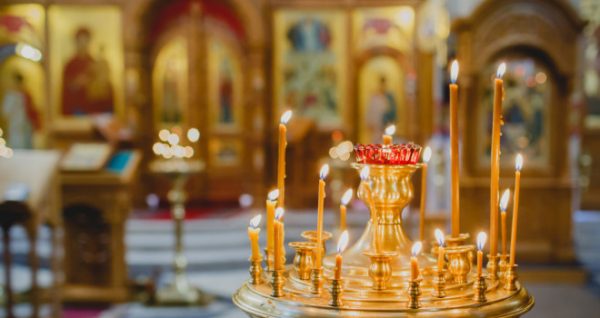“bearing fruit through patient endurance”
When looking over the liturgical calendar this week, and reading the lives of the saints, there stood out three names among the many who, along with incredible personal asceticism, bore lifelong struggles on the behalf of truth yet were afflicted constantly by the political era into which they were born: Athanasius the Great, Mark of Ephesus, and Maximos the Confessor.
Saint Athanasius (+373) is well remembered by his presence (being only a deacon) at the First Ecumenical Council and his refuting the heretic Arius. What we often forget is that for the majority of his tenure as a priest and bishop (50 years) he was persecuted by his fellow clergy and monastics, as well as the Emperor and government officials. For 20 years he was exiled and had to author his works and govern his see from abroad.
Maximus the Confessor (+662) was called out of monastic life (as will be Mark of Ephesus) in order to use his respected intellect and classical education to defend the Faith from heresy. He undertook this great challenge for many years and was ultimately so successful that the truth of the Faith triumphed and his adversaries stooped to having him falsely imprisoned, where his right hand and tongue were cut of. Miraculously, he was able still to speak and write. Like Athanasius, Maximus received almost no support from those we would expect he could have depended on: fellow monks, priests, bishops, and Christian rulers. But he could not.
Mark of Ephesus (+1457), called out of regular monastic life in order to accompany bishops and representatives to the Council of Florence, found himself to be the solitary defender of the Church at a council that was weighing the importance of Orthodox theology against victory over Islam by way of union with Roman Catholicism. All representatives eventually signed the union except Mark, to which the Pope replied, “If Mark did not sign, we have gained nothing.” Having defended the integrity of Orthodox theology against Latin papism throughout the council (which lasted several years), the union failed, and Mark returned to Constantinople stating simply, “Better the turban of a Turk in our city than the miter of the Pope.” Mark died before the fall of the city, but Muhammad II installed Mark’s most devout disciple as Patriarch.
Our appreciation for such great examples of faith, trust in God, and perseverance is multifaceted. On one hand, thank God that His truth is always preserved through the righteousness of a few perfect servants (Noah, Abraham, Moses, John the Baptist, Joseph, Mary, the Apostles, martyrs, pillars of the faith, etc.) who lead the flock of the Church. True disciples are rarely the majority. “If the world hates you, remember that it hated Me first” (John 15:18). And thank God the fullness of the faith does not depend on us, but is offered for our participation.
On the other hand, “being in our right mind” pivots on our remembering that when we try to live authentic life in Christ, “the world” (those who have not made the same commitment, the passions, our own ego, and everything else that is not compatible with truth and Christ) turns against us and causes us to suffer. “Blessed are those who are persecuted for righteousness’ sake, for theirs is the kingdom of heaven.” In other words, when we choose to struggle for righteousness we can expect for life in this world to be rough.
Today, there are still people having their hands or tongues cut of for their faith. But “persecution” in America comes in many forms: Endless opportunities for pleasure, materialism and comfort, the clash of our ego with that of others, old wounds that just don’t want to heal very easily, failed expectations with family and friends, true opportunities and callings never fulfilled, aging, loneliness, exhaustion, and a menagerie of unexpected disappointments. In my own spiritual weakness I imagine Saint Maximus looking at his missing hand and musing with his shortened tongue, “Well, this isn’t exactly how I expected my life to end.”
As difficult as it is to grasp, let alone practice effectively, most of our persecutions and sufferings of every kind are solved, and resolved, and brought to closure by way of patient endurance. “Rejoice in hope, be patient in suffering, devote yourself to prayer” (Romans 12:12). Words like these in Scripture are not suggestions for pleasant behavior, they are the explicit answer to the question, “What am I supposed to do?” And to set about being a Christian assumes that we are dedicated to “hold firmly onto the word and bear fruit through patient endurance” (Luke 8:15).
Patient endurance is doing the right thing, making the right effort, holding to the truth that has been delivered to us, no matter what is going on, who’s doing it, or how long it lasts. The world screams, “Escape! End the struggle! You deserve ease! It’s not worth it! It’s not doing any good! You can give up and not feel guilty, it’s logical to quit! Te odds are against you!”
But we who have chosen righteousness have also chosen struggle and persecution. Why? To exchange less than 100 years of struggle on this earth for eternal life; and that, my friends, is a good trade. “Blessed are you when men revile you and persecute you and utter all kinds of evil against you falsely on my account. Rejoice and be glad, for your reward is great in heaven” (Matt. 5:11). And, just checking to make sure, how long am I to plan on enduring? “Be patient, therefore, dear friends, until the coming of the Lord” (James 5:7).
In the struggle with you against entitlement and “prosperity gospel,”
Fr. Thaddaeus
You can follow us on Twitter, Facebook, Instagram, Telegram, or Parler

















